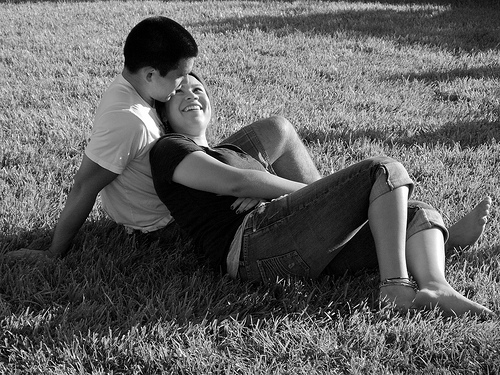 Marriage and relationships inevitably go through challenging times. This article highlights some of the common problems couples experience. Men and women often mis-interpret the words and actions of each other because of gender differences. Some of the material also applies to same sex couples.
Marriage and relationships inevitably go through challenging times. This article highlights some of the common problems couples experience. Men and women often mis-interpret the words and actions of each other because of gender differences. Some of the material also applies to same sex couples.
Work Demands
Do you have demanding jobs requiring a lot of energy, commitment and long working hours? How does this affect your relationship? Do you need to re-evaluate your work-life balance? Are you making time to connect or feeling distant? Has intimacy and sex stopped?
It is worth making time for each other and finding activites that nourish and invigorate you. Falling out of love is a symptom of not giving enough attention to what is going on.
Getting Support
Who do you talk to when you are having relationship difficulties? Our parents often can’t relate to modern day pressures or changing times. If you can, give your parents the chance to offer you support. It's useful to find out how they have overcame difficulties. Maybe you are fearful that you parents would worry or 'not be proud of you' or think less of your partner, nonetheless they would like the chance to support you. Relationship challenges are part of life.
For women, friends offer good support up to a point, whereas for many men relationship issues are just not something you talk about with your mates. If you are recently married or about to get married it can be hard to know how to talk about what is happening. It canfeel that the spark/ intimate emotional connection is missing. Some couples find a way to muddle through, whilst others progressively argue more and more. There can be a sense of “it shouldn’t be like this!’, a sense of failure. The fear that saying something will just make things worse.
Fortunately more and more couples are open to looking at the challenges that relationship and marriage bring.They are choosing to have fulfilling relationships rather than accept the status quo. Relationship counselling proivdes the safety and freedom to learn how express more yourself. A relationship counsellor is impartial, and experienced in the issues you're facing It’s a relief to be able to find the words that express you are experiencing, and to discover there is something you can do about what's troubling you.
What women say when they feel unsupported.
Women typically make the following complaints about their male partners:
- When he is upset, he will not talk. I feel left out
- After we get close, he pulls away and doesn’t want to talk
- When I talk about my feelings, he can’t listen and feel what I’m feeling. He needs to try fix my issues which infuriates me.
- He doesn’t understand what I need when I am upset
- When we argue, he always needs to be right
- When I get upset, he shuts down
- He rarely says he loves me
- I feel alone and unsupported
At times like this some women deal with the underlying lack of support by working harder at work, then getting busy with what needs to done. Events such as planning a holiday or planning a wedding highlight feellings of not being supported.
What men do when they feel unsupported
When men feel unsupported they usually do or experience the following:
- Work longer and harder
- Avoid ‘we need to talk’ situations
- Feel nagged, demanded of ,unappreciated
- Get angry about unrelated things
- Try to use sex to connect, feel rejected, then stop initiating sex
- Watch a lot of TV or use the computer
- Make an attempt at reconciliation,fail to understand that their partner unconsciously tests to feel safe. They take the test personally, feel rejected and give up.
- Look elsewhere for love and appreciation.
A theme is that men feel guilt/shame that their partner wants to talk. Men often experience talking as criticism. They hear requests as a sign that they are not getting things right. It may surprise women that their partner loves them and deep down “really wants to get it right for them” . Men close down their desire to express their love when they feel “demanded of” and unappreciated.
Relationship Stages
A common wish is to ,'go back to how it was before' resulting in comparing what is happen now with an ideal of the past. It's important to understand that relationships deepen and go through progressive stages. There is a rightness about issues coming up when they do.
At the beginning of a relationship we are intoxicated with each other. The relationship is fresh. We are excited. Making love and connecting comes naturally. What follows is usually a period of getting to know each other, possibly moving in together, getting married. This is the stability phase which is good for building shared experiences and forming a connection.
What follows is the stage of working through conflict and appreciating differences. It's the process of the relationship maturing. A relationship requires a balance between partners creating safety, emotional bonding and partners asserting ourselves over what's important. Too much routine and safety kills passion. Too much arguing and conflict feels unsafe. Resisting the "conflict and appreciating differences' stage by holding onto the hope that we can go back to the effortlessness of when we first met doesn't work. We need to face and work through the conflict. Conflict is a necessary stepping stone to teach us and transform us into a deeper udnerstanding and intimacy. Of course it’s hard to see this when we are hurting from an argument and just want things to change.
Gender Differences
Women usually need to talk to feel emotionally supported. They value their partner connecting to what they are feeling and being supportive without offering solutions. Women speak in an emotional flow about what is true the moment. It’s not a literal message. The talking isn’t solution focused. It’s about making a connection.
Men in general want to act instead of talk, to manage their feelings. They can experience their partner wanting to talk as "mind-bending ",as there is no purpose/solution focus . Men can feel responsibile for their partner’s woes as if it is their fault their partner is distressed. Men often don’t want to talk about their work day. They prefer to do some mindless activity to forget about problems. Talking about feelings isn’t easy. There is a lot of ego investment in being in control, knowing what to do and not showing vulnerability.
Men usually value themselves in being able “to provide”, “get it right for their partner”. In modern times this "provider role" needs updating to include providing an emotionally supportive presence . It’s confusing for men and women who are both struggling to meet conditioned/ archetypal needs. For women the challenge is how to be powerful and receptive. How to request and receive emotional support. How to appreciate men. For men the challenge is how to be present and potent. How to be in touch with desire and not overreactive and able to emotionally provide.
Relationship counselling is a good place to clear up misunderstandings and look at changing gender roles/ expectations. Small practical interventions make a huge difference. Men learn the kind of listening women really want. Women learn particular skills of how to approach and speak to men.
Communicating better
In relationship counselling we see that underneath the wish to “communicate better” is our struggle to manage strong feelings. How do we deal with our rawness, feelings of smallness, shame or rage when our partner says just those few words that trigger us? It’s amazing how we trigger each other. These triggers can be understood. Understanding these triggers can make our relationship better and help us develop and mature
Relationship counselling looks at the family enviroment we came from. Whether we are consciously aware of it or not, like it not , we are hugely influenced by the model are parents gave us of relationship. We learnt a model of what is means to be a man or a woman, how feelings are dealt with, how to get love, how to express love, how to remain safe, how to argue, and what the relationship rules and expectations are.
Power and vulnerability
In the process of growing up we learn more or less how to survive and be loved. We also learn how to love. Growing up doesn’t stop ! Our relationship helps us revisit how we express power and vulnerability. It’s useful to imagine that we each have an emotional gate that we can learn to open and close. When our values are threatened, or someone crosses our boundaries, or our needs are not being met, it’s an important to assert what we need. We need to open our emotional gate to express emotion/ feeling.
At other times we need to be able self-soothe, to keep the gate closed in order to deal with a higher priorities than what we are feeling in the moment. It might be more important to listen to our partner before reacting.
If we have a blocked gate ,we become numb though repressing feelings. Anger builds or may turn inward onto ourselves. An event may trigger us to explode the gate open under pressure. We need to regulate our emotional gate so we get the balance right. Expressing feeling is an appropriate way is something we can relearn.
Relationships are the training ground to manage power and vulnerability. Relationship counselling provides a place to work together on arguing,sulking, distancing, telling your partner what to do and put down humour.
Let Your relationship support you.
Some couples feel their relationship supports their wellbeing . They feel supported. While others feel alone in their relationship and don't feel supported. Some couples long for the sense of "relationship" as – something they are in , that affects them , that gives them a sense of equilibrium, inner richness and loving attachment .
A qualified relationship counsellor helps you focuse on the quality of being together in “relationship”. Through the process you begin to discover that your relationship interactions are co-created, both the one’s you like and the one’s you don’t. Practically you untangle emotional blocks, lift resentment move away from “whose to blame?” patterns. You see that “you are in this together” and like other couples have potiential to experience being in relationship differently.
By Richard Cole
